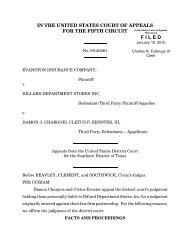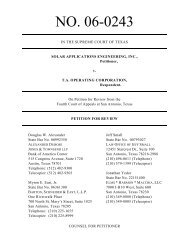Laughlin v. Nouveau Body & Tan - The Appellate Record
Laughlin v. Nouveau Body & Tan - The Appellate Record
Laughlin v. Nouveau Body & Tan - The Appellate Record
Create successful ePaper yourself
Turn your PDF publications into a flip-book with our unique Google optimized e-Paper software.
Case: 09-10622 Document: 00511064454 Page: 6 Date Filed: 03/29/2010No. 09-10622filing of the petition; [and] (4) with intent to hinder, delay, ordefraud a creditor or officer of the estate.”Pratt, 411 F.3d at 565 (alterations in original) (quoting Pavy v. Chastant (In reChastant), 873 F.2d 89, 90 (5th Cir. 1989)). Here, the parties dispute whetherthe pre-petition renunciation of <strong>Laughlin</strong>’s succession rights constituted a“transfer” of property for the purposes of § 727(a)(2) and, if a transfer of propertydid occur, whether the transfer was done with intent to hinder, delay, or defraudcreditors.2. Transfer and Interest in Property<strong>The</strong> bankruptcy code defines “transfer” to include “each mode, direct orindirect, absolute or conditional, voluntary or involuntary, of disposing of orparting with-- (i) property; or (ii) an interest in property.”11 U.S.C.§ 101(54)(D). “‘What constitutes a transfer and when it is complete’ is a matterof federal law. . . . since . . . the statute itself provides a definition of ‘transfer.’”Barnhill v. Johnson, 503 U.S. 393, 397 (1992) (quoting McKenzie v. Irving TrustCo., 323 U.S. 365, 369 (1945)). However, “property” and “interest in property”are not defined in the code. “In the absence of any controlling federal law,[property and] interests in property are [ ] creature[s] of state law.” Simpson v.Penner (In re Simpson), 36 F.3d 450, 452 (5th Cir. 1994) (per curiam) (citingBarnhill, 503 U.S. at 398).Property interests are created and defined by state law. Unlesssome federal interest requires a different result, there is no reasonwhy such interests should be analyzed differently simply because aninterested party is involved in a bankruptcy proceeding. Uniformtreatment of property interests by both state and federal courtswithin a State serves to reduce uncertainty, to discourage forumshopping, and to prevent a party from receiving a windfall merelyby reason of the happenstance of bankruptcy.Butner v. United States, 440 U.S. 48, 55 (1979) (internal quotation marksomitted).6




